Motherhood in Climate Crisis

The story so far
As of December 2022, this project has completed its pilot phase and the group are ready to share their story. What follows is a breakdown of their journey including the bumps they navigated along the way. It culminates in the story performances recorded on the day.
For a short taste, here is the project summary video [4:41]:
Short on time?
The origin
The overlap of the two issues of climate crisis and motherhood had been simmering away with Sophia for a number of years as her professional work invited her to consider the emotional weight of society’s impact. An unpopular disquiet was brewing: driven by the need to be useful in what the UN and international scientists call the challenge for our generation, is having children the most useful act?
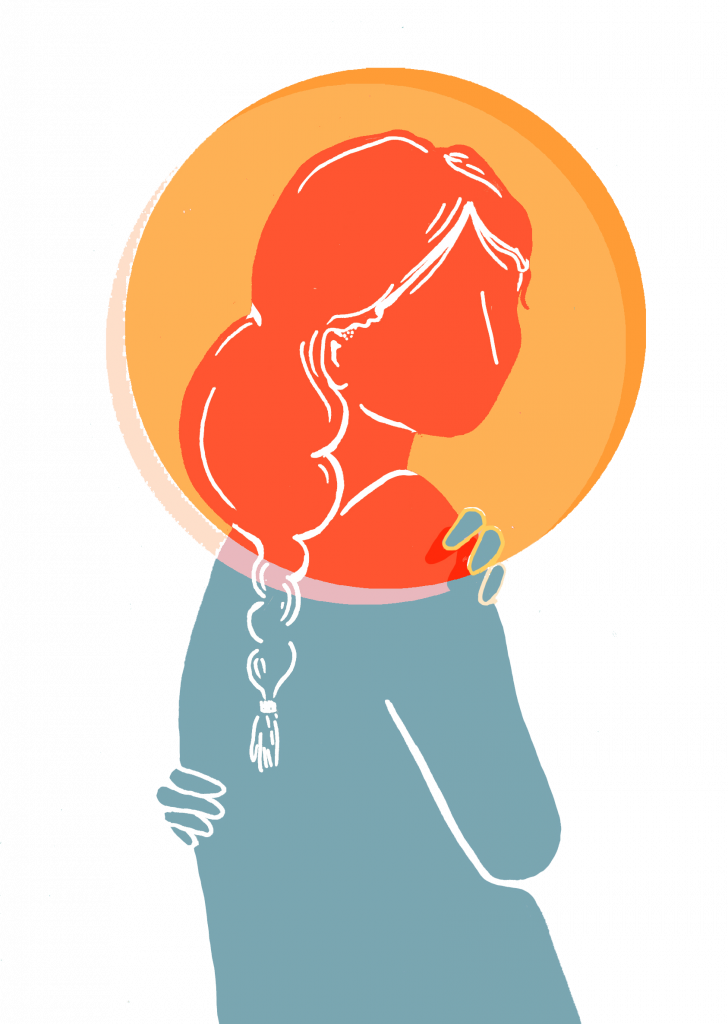
“My biological clock seems to be closing on track with the amount of time we have left to prevent runaway climate change.”
Sophia
What Sophia had noticed was that whenever she was feeling courageous enough to raise the topic with others, people always had something to say. Conversations about the climate crisis and as a consequence questioning motherhood emerged from an online community of women of which Sophia is part. They hosted a dedicated online event, with clear boundaries. Women were invited to speak on their own experience, rather than share opinions on the ethics of other’s choices. In particular, women were reminded that a populationist rhetoric, which can veer quickly into eco-facism would not be welcome in the space. The women had 5 minutes to share their story, whilst the group bore witness to these stories. Despite the limitations of screens the emotion was palpable. One participant relayed that they no longer felt as alone around this issue. Sophia realised that if a safe enough space could be created, giving people permission to tell their story, the heart could be put back into this type of climate conversation.
“It was one of the most powerful online events I’ve joined in 2021.”
Participant
The idea for the project emerged: is there a way to do this with strangers that is safe? How might personal testimonies on this topic shed a very real and emotional light on the climate crisis, in a way that talk of degrees centigrade and parts per million does not? How might the media pitfall of pitching one woman against another be avoided? How might there be gentle provocation? How might the privilege inherently embedded in choice be acknowledged, and the validity of women’s anguish be honoured?In the media, these conversations were getting more attention, from Alexandria Ocasio-Cortez validating people questioning parenthood, to Naomi Klein sharing it, to data from 10000 young people, with four in ten saying they were worried about having children.
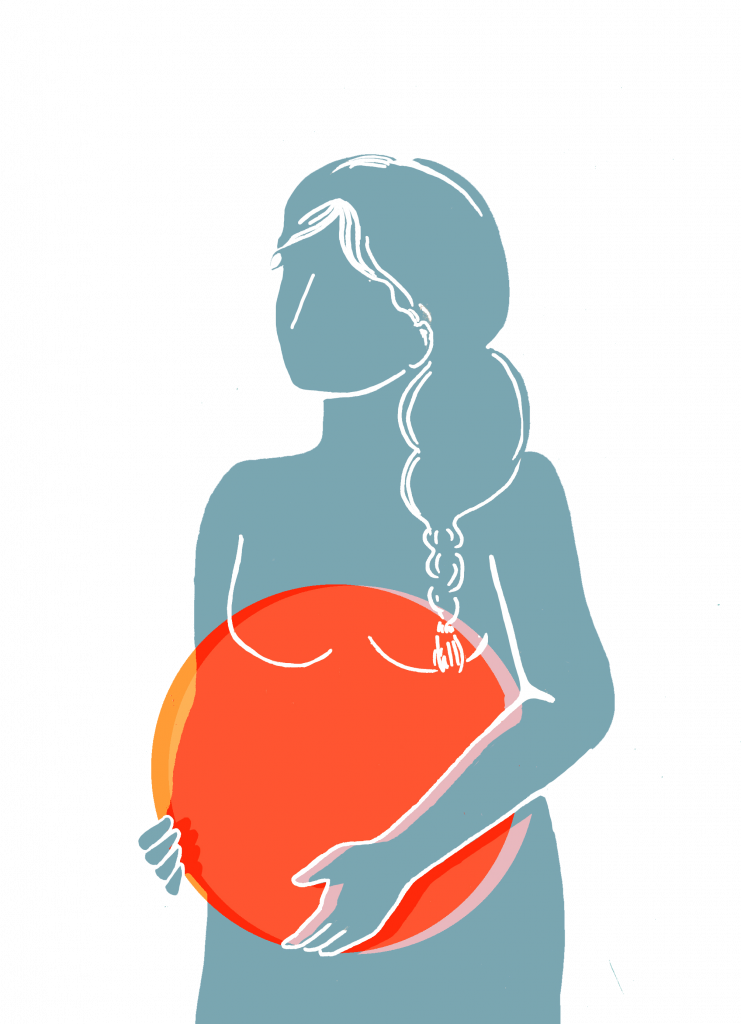
“Reproductive anxiety in the climate crisis is growing amongst younger generations who live in Western industrialized nations. Yes these are private decisions, but they’re also deeply collective, as our ability to imagine the future is informed by our political reality.”
Britt Wray

The team building
Sophia shared the concept with Celia Turley, a creative producer of socially engaged arts projects, who she had met previously when they were both involved in organising for a Green New Deal in Bristol.
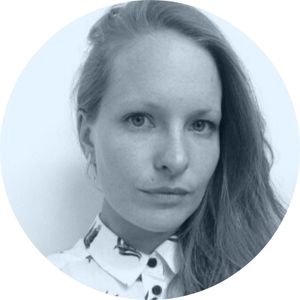
Frontline BIPOC communities across the world are already feeling the very real impacts of living in a dramatically changing and unpredictable climate, and the fire of young people’s action via the global school strikes tells us of the fear, grief and anger held by young people looking to the future. These clarion calls speak to the instability and uncertainty of our world and I find this a scary place from which to begin thinking about family.
“This conversation touches tender and unseen places for many people; fears and hopes that may never have been aired in public. I knew that creating meaningful strategies and structures for women to be held and supported would be essential for the process”.
Celia Turley
More info on Celia
I am a creative facilitator and producer of socially engaged art projects and public programmes. This means I support and collaborate with artists and communities to make creative work together. Often these communities do not think of themselves as artists, or even perhaps, creative. I believe that everyone has a creative contribution to make, if they are listened to, supported and resourced in the right way. In addition, I am a youth worker with refugees and young people seeking asylum, aged 13 – 19. I volunteer as a community conflict mediator and I am learning about the wild medicine of plants, trees and fungi with Rhizome Community Clinic in Bristol. I mention all these things because as a freelance worker in a precarious economy and with an ever-expanding curiosity, I have always been shape-shifting, side-hustling, juggling multiple roles. I no longer make this labour invisible in attempts to tell a single story. My work is an intimately connected constellation of practices. Throughout it all, I am experimenting with answers to the knotty question of how collaborative, creative work can model and communicate possibilities for collective liberation and healing justice.
Together Celia and Sophia started to explore how to bring the project to life. Within weeks, Necessity came on board: the project’s first funder. With an enabling and progressive agenda that seeks to support projects building solidarity and collaboration on themes such as creative communities and environmental justice, Necessity provided the funds and free rein that was needed to create a project trying to do things differently. Funders like this are few and far between and the project leaders are really grateful to them. Their early backing was instrumental to the project’s unfolding.
Celia started reaching out and bringing a team together. Sabba Khan came on board to bring the project to life visually. A pitch deck was built, arts funding applications completed, and the Climate Psychology Alliance came on board as care partners.
/col
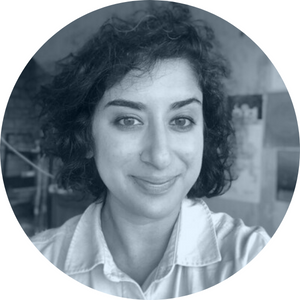
“When [Celia & Sophia] got in touch with me asking me to capture the conflict women face against the climate crisis and motherhood…I wanted to capture all these emotions. We spoke a lot about hey they want to make space for all these thoughts, encourage dialogue and debate, without judgement or prejudice, a place for females bodies to explore and expand…the artwork captures three major states: self, world and other.”
Sabba Khan
“A wonderful creative project addressing an important issue for our time, delivering with much love and compassion.”
Judith Anderson, CPA
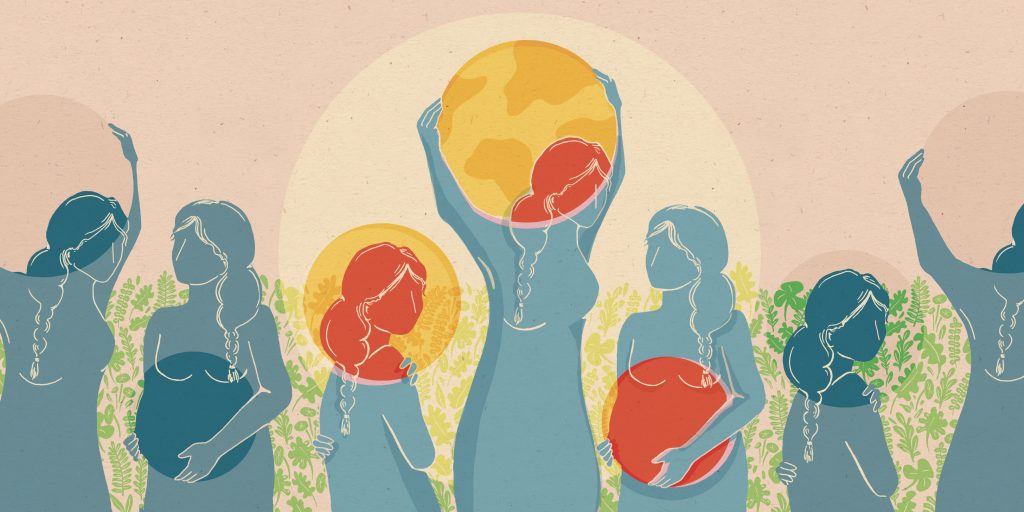
Celia knew that a sensitive and thoughtful creative practitioner, attuned to the complex politics of the issue and committed to telling women’s stories, would be key to the success of the project. She spent a joyful few weeks talking to a range of interesting and skilled theatre makers, but when she met Liz Mytton, she knew she was the person who would be able to bring something special to the project.

“I came to this project not just as a creative facilitator, but also as a mother invested in this conversation and at times, a women on the edge, anxious for the climate and the seemingly insurmountable task to shift both narratives and realities about our future planet.”
Liz Mytton
More info on Liz
I am a theatre practitioner working in site-specific, community settings. I work primarily on co-created devised performance with women and young people who have been marginalised, usually due to poverty, race or mental health. I came to theatre as a writer but also as coach, trainer, and housing and mental health advocate – I am hugely invested in sharing stories of overcoming oppressive systems, and my personal story of fighting injustice flows alongside my professional work.
Also key to the project was centring care, so Jo McAndrews was brought in as therapeutic facilitator. All the team members were committed to holding a core value of care, but having someone who brought therapeutic experience to the team and who held care as the main focus of their role, meant that it would be integrated throughout.
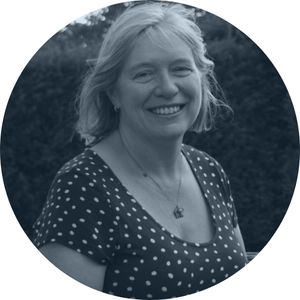
“I was really interested in being involved in a project that brings storytelling theatre together with mothering choices and experiences in the context of the climate crisis. When I heard they were brining in a facilitator whose job it would be to hold the care of everyone’s wellbeing I was delighted! This is the bit that so often gets left out of interesting projects and here it was, built in from the beginning. This role had my name on it.”
Jo McAndrews
More info on Jo
I trained as a psychotherapist working with the arts, and have many years experience of training and facilitating groups in the field of trauma, recovery, resilience, communication and wellbeing. I’m a member of the Climate Psychology Alliance and my work is now focussed on supporting young people, parents and professionals in the face of the climate crisis, especially with responding to climate distress and growing resilience through cultures of care. I was a storyteller and a member of a Playback Theatre group, as well as running a community choir for the past 15 years. I have a strong interest in working with the arts and imagination to explore powerful personal and community issues. I’m mother to a teenage daughter and the experience of parenting underpins everything else I do. Like others, I’m working hard to work out how to bring up a child in a very uncertain world and I welcome the perspectives of people who are making different choices about having children.
Celia also secured additional funds from Brigstow Institute and from Bristol University. Maria Fannin, a human geographer and researcher, joined the project team.

“Exploring these issues through a theatre-based, care-centred project was something new for my own work as a researcher, and spoke to my interest in how arts-led projects might enable new possibilities and communities to emerge where conventional communication around climate change might not.”
Maria Fannin
More info on Maria
I am a Professor of Human Geography and lead the Gender Research Group at the University of Bristol. My research focuses on gendered notions of risk and responsibility and gender-sensitive approaches to economic agency. I am an experienced collaborator in multi-disciplinary projects exploring women’s health, technology and motherhood and am Trustee of the Feminist Archive South.
Whilst Celia was actively recruiting and fundraising, other team members were also bringing together more people who were willing the project forward in all sorts of ways. Women with an existing platform came on board as champions, including Dr Britt Wray, Blythe Pepino, and Jen Gale.
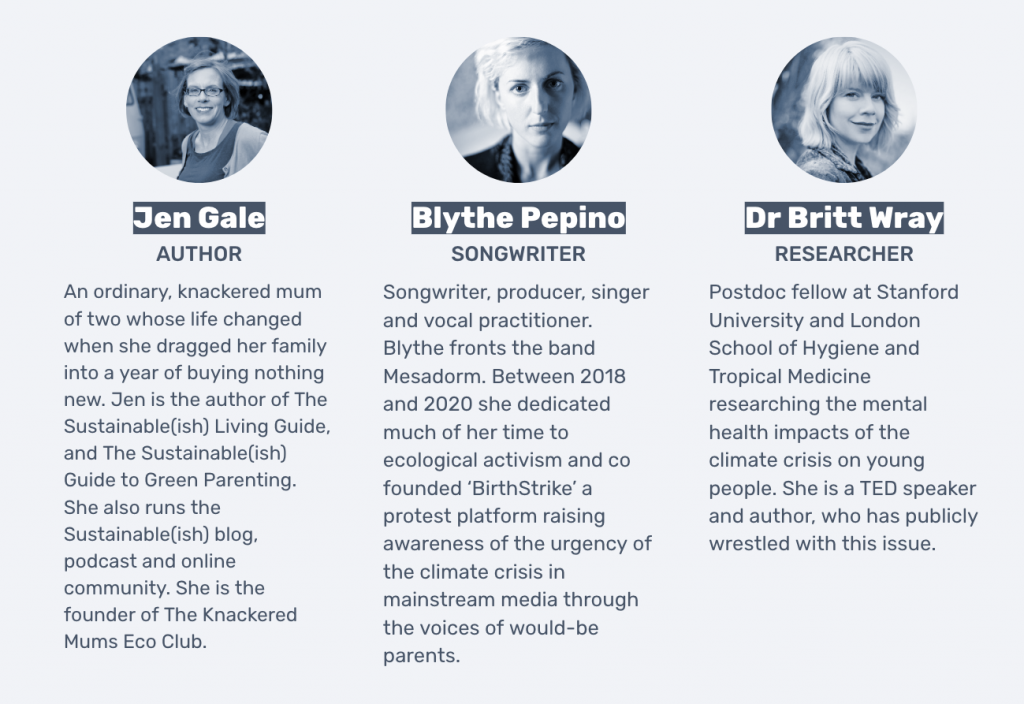
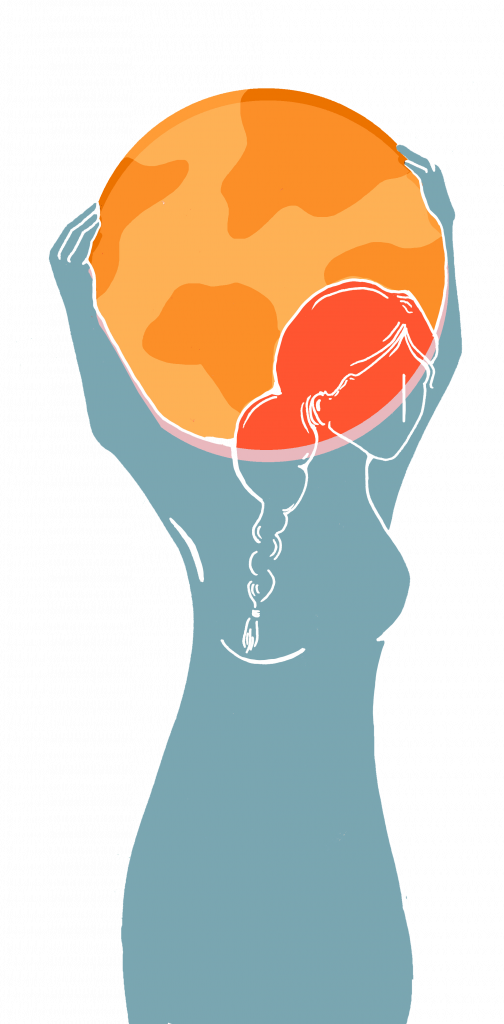
“As more and more young people fall into states of anxiety, grief and dread about the future any child they may have today would have to live with in a climate changed world. We need spaces to talk about this with compassion and curiosity. The stakes could not be higher, the issue could not be more existential, and what we require for our own wellbeing is that these emotions can rise to the surface with support, preventing despair and unlocking wells of creativity and connection that can help us heal our tattered world.”
Dr Britt Wray

“Motherhood is something of a double edged sword when it comes to the climate crisis. At the very point where we’re suddenly so much more aware of the future our kids might be facing, our lives are turned upside down and there’s no time to sleep, let alone think about trying to do things differently. We need to empower, enable and encourage mothers to share their worries and fears, as well as the tools that they’ve discovered that help them to parent in such uncertain times.”
Jen Gale
With £17k now raised, plus £5k contribution from With Many Roots, Sophia’s own organisation, the project team decided to run a pilot, even though the original fundraising target had not been reached. This started in March 2022, with the first meeting of the project team face to face.
Liz and Jo demonstrated how they work with some taster sessions in a small classroom in the Geography department at the University of Bristol. There was much laughter and many tears as team members opened up about the topic they were going to be asking their workshop participants to do.
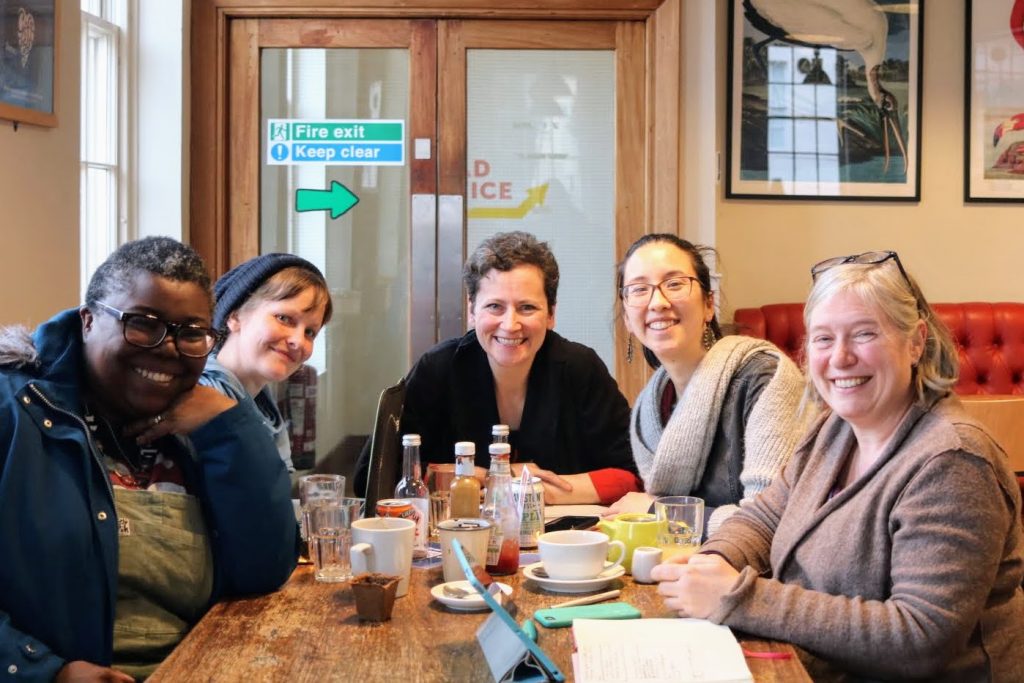
Meeting in person also allowed conversations highlighting differences in expectations. With each team member holding a part of the process and bringing in their years of experience, they realised there were some mis-matches in approaches that needed to be addressed. There was a strong desire to speak to the global nature of women’s decisions on motherhood being impacted by climate change, and for building international connections and sharing women’s stories with communities across the world – potentially opening up a vital cross-cultural conversation.
At the same time, other members felt that in attending to an emotionally sensitive topic, and after more than a year of interactions mediated by technology during COVID, creating a safe container for in-person interaction had powerful potential. Trust is the essential underpinning to collaboration, and the immediacy of an intimate space would help to build the bonds required to support the women’s collective creativity. It was hoped that a relational, artistic practice rooted in a shared geography would more easily facilitate the possibility of further collaboration, friendship and climate action beyond the limits of the project.
Placing an emphasis on a big public moment might create a barrier to women whose voices are often marginalised, and who may have to overcome larger obstacles to contribute to the conversation in the first place.

The recruitment
The move from the conceptual to the practical was rapid. With a venue and dates secured, what followed was hectic activity to try to reach as many people and networks in the Bristol area. Liz was featured on Ujima radio, and Sophia was featured in a dedicated episode for the Climate Psychology Alliance podcast. Community groups, women’s centres, climate organising conferences and many other places were visited to try and raise awareness of the project.
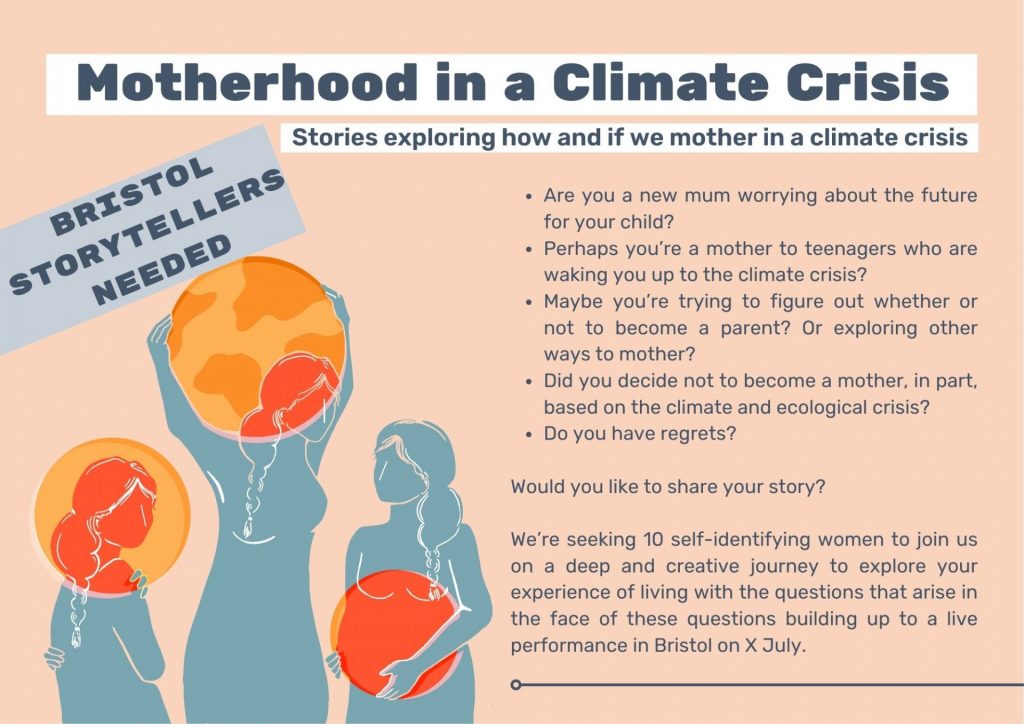
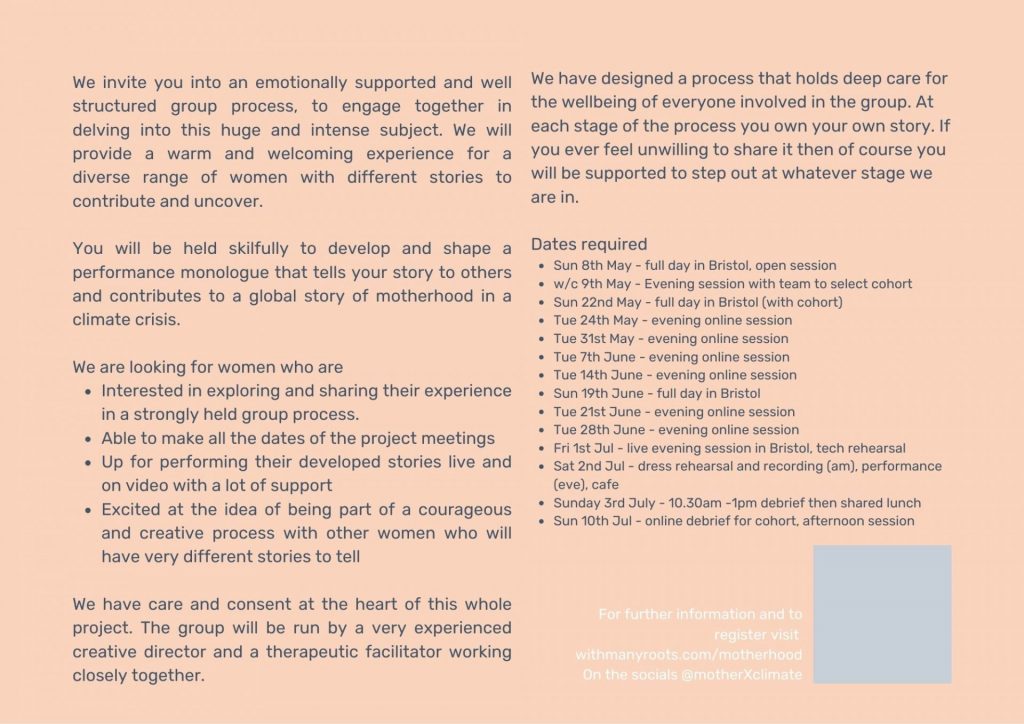
A public session ran in May 2022, joined by 8 women, some travelling from as far as London. The team learned that in some circles the project circulated many times, but in others outreach had been less successful.
Liz and Jo ran a powerful session, with a mix of theatre-filled activities, reflective individual exercises, and group discussion. The eight women experienced a sample of what the 5-week process might be like. There was a range of different experiences of motherhood: some were mothers already; others were ambivalent, or not wanting to bring a child into the world as it is. There was an age range from 24-37. It was a full on day.

“It was gentle, kind and inclusive. I loved the physical movement and care. I felt like I was in a safe supportive space and it became really easy to connect with the other women in the room.”
Participant
“I wanted to get in touch to say yes please, I’m in! I just feel that although it’s an extra huge commitment due to the travel time etc it’s just such a unique and necessary project, and I found it so helpful and enlivening that I’m totally called to be part of it.”
Participant
Watch a short summary video below [30 seconds]

The Process
Because of other commitments, notably juggling motherhood and work, a few participants did not stay with the project for the rest of the journey. So 5 participants – Anna, Daniela, Ruby, Jodi, Rosanna – and Sophia – would go forward through to performance. They met online a few weeks later, with Liz encouraging them to write to different prompts, haikus, blessings, letters etc. Jo led supportive check-ins and groundings, attending to the culture of care. Despite all that life can throw, the group showed up week after week.
In between sessions, Liz was in touch with participants, developing their writing, drafting an emerging script, supporting them in telling their stories. Jo continued with the emphasis on people’s process and wellbeing, listening and offering support when they were struggling.

“Having Jo in the room, having the reality of real care put into practice. I have never ever ever been in a room where I felt like if we went off track because we couldn’t deal with something that could actually be accommodated. Normally it’s a tokenisation accommodating that doesn’t derail the schedule. With Jo and her practice things took the time they needed.”
Participant
A key moment was the weekend workshop on 11th/12th June: another powerful two days. In one moment, Liz had the participants shouting in their best Eastenders accent and giggling; and in the next, candidly sharing personal stories of fibroids, endometriosis, bleeding, abortions, and miscarriages. There was something special for participants about that moment. They were invited to respond to what they’d heard by holding a shape without using words. The next moment participants were giggling again as they made up sea shanty lyrics about taking down the patriarchy.
Liz’s facilitation exercises where groups of participants created tableaux on difficult topics opened up a conversation that staying purely in their heads would never have done. The observing group commented too on what they saw in the participants’ work. Even lunch breaks were a highlight: over wraps and crisps and the occasional ice lolly participants touched on lighter and sillier conversations.
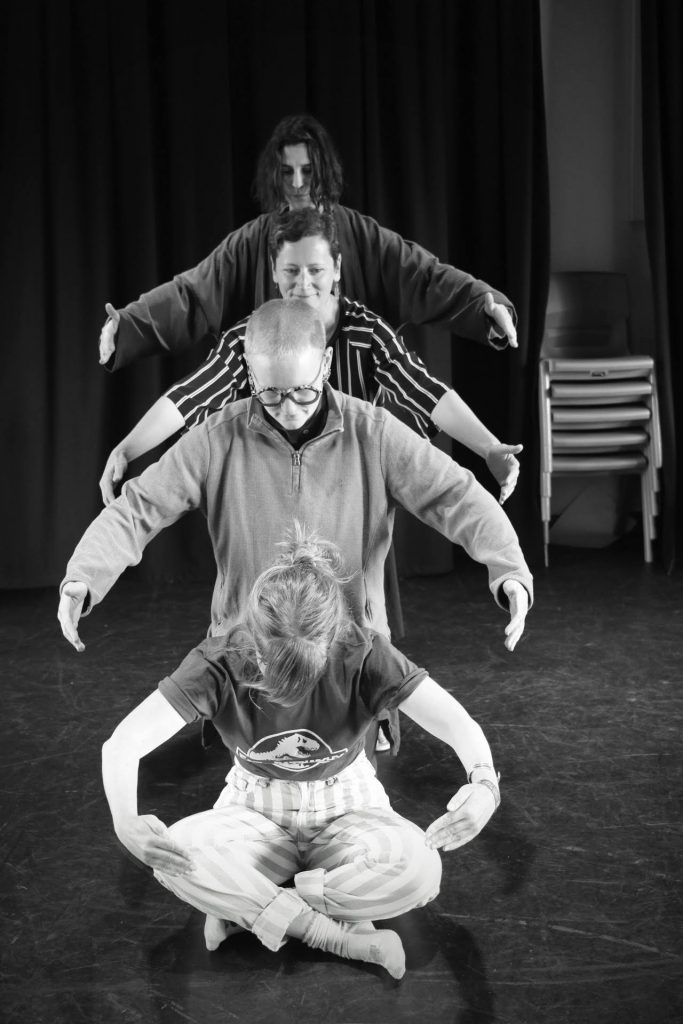

“The activity where we were given discussion points to do with motherhood or the climate played an important role in the process. I think it helped us individually to develop and give voice to thoughts that might not have been formed yet. It also gave us an opportunity to have different or opposing views with each other, experience and feel this and have the courage to carry on. Having to then make a group shape in relation to one of the topics brought us together in a creative way. It was a great combination of head and heart and individual and team.”
Participant

Addressing the lack of diversity
From the first open rehearsal, the team were acutely aware of the lack of diversity in the group – it was a fairly homogenous cohort of mainly white, middle class women. This was not for lack of connecting and communicating with diverse women’s networks, parenting groups and community spaces across the city. However, due to the way that the project came about, the usual partnership building that would have been integral to the development of a project like this, didn’t begin with the conception of the project. The concern was it might appear that the group were speaking authoritatively on the experience of women generally, when it was clear that many women and stories were not represented. They decided that a real and dedicated effort would be required to address this, and that this iteration of the project was effectively phase one of something that would need to be revisited.
So the project shifted to this two-phase approach of local and global. The local was a process supporting intimacy, trust-building and co-creation for those women that had already shown up to develop a performance on this in the Bristol area. This would build up to a live performance, with professional recording of a dress rehearsal.
Global was about taking these stories out to a wider audience and reaching those who might feel more isolated on this topic. Screening an online premiere with ‘talk show’ elements around it and bringing in a global audience, amplified by the project champions. Within the constraints of the project as it was, Celia and Sophia felt that a much longer time frame and relationship building phase was necessary to meaningfully address the missing voices in the room and that a more superficial engagement would be tokenism. The project team felt the need to say it like it was: the group lacked diversity, from a race and ethnicity perspective – Liz being the only woman of colour. There was also not as broad a range of motherhood perspectives as the team knew to be out there: an older woman who had decided not to have children, for example, or a mother of teenagers, or a mother who had taken the adopted route in part due to the climate crisis, or a perspective from a 19/20ish year old.
To build grassroots relationships, the team felt it needed more time to meet, listen and learn from the needs of local women’s groups; to feed diverse perspectives into the project shape; to develop partnerships based on meaningful collaboration allowing for more shared ownership of the project. As a project that had been born from the personal experiences of a very particular demographic, it held an authenticity and self-evident truth in those communities but the team felt it was not successful in communicating the question and ideas to women with different experiences. There are rich questions to be explored in terms of how this question plays out across diverse communities, but it became clear to the team they would not do this meaningfully in this initial process.
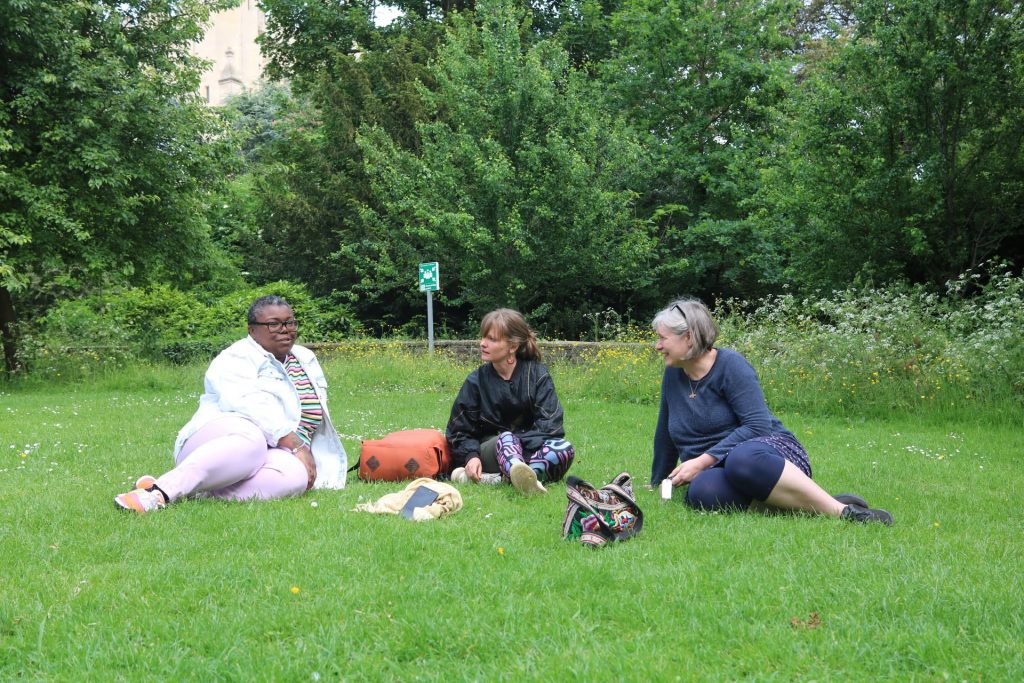
The seemingly impossible was finally raised by Jo: might the public performance aspect of the project be delayed? In an emergency meeting Sophia took from her car the project team gathered. They knew both the concept and the women they had convened had potential, and that their individual stories were powerful and their courage in wanting to speak out should be honoured, but still they didn’t feel they could go public on this topic as they were not a representative enough group.

“Some of the problems in the world today and all too often in the workplace – are people pushing through a task or project simply because they said they would. Or because the boss told them too. As the ‘boss’ of this project, let’s not perpetuate this idea. Let’s learn and iterate.”
Sophia
The team had made its own parameters and it could change them. They had learned something fundamental, and could now adapt. Thankfully, funders were very flexible and although the plan for the final event was a public performance, it didn’t necessarily have to happen this time. This was, after all, the first phase of the project. The team identified that it was the process that was key, not the output.
Liz suggested participants were invited into the team’s thinking, so that began the next weekend’s meeting. Each of the project team named the issue and shared their suggested proposition. There was agreement in the room, though with a twinge of disappointment around the absence of a performance. The team worked with this and landed on the ideal situation: focus on the filming and collecting the individual stories as monologues that could then sit next to future stories from a wider range of voices. Also, an open rehearsal could take place: participants could invite a close friend or two to witness their testimonies and honour the journey they’d taken.
It seemed there was a way forward that met everyone’s needs, culminating in a different kind of performance everyone could feel proud of.

The final preparations
Building up to the final week, Liz shared a script with the group, pooling together stories and elements from the group exercises, including a sea shanty and blessings. An online run through took place, where it was hugely moving to hear each person’s story scripted into a coherent and powerful piece. Stories were placed in an order that made sense in the larger flow of the group story. The script was woven together with elements of the whole process: activities that had taken place in sessions which made a record of the whole group’s experience, as well as that of individuals. A conversation on the climate science, themes of support, references to participants’ own mothers, new lyrics to a song… Liz wove them all together and suddenly everyone could see how strong these stories were in the group process.
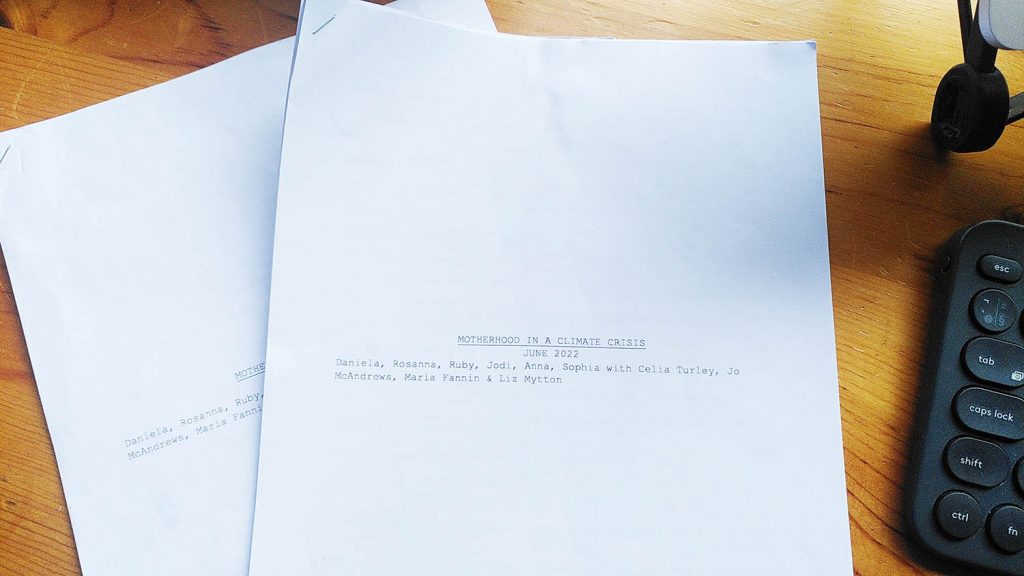
The night before filming, the project group gathered in Bristol for a technical run through. They were joined by Floating Harbour films, with whom Celia had been working to communicate the filming needs of the project, from capturing each monologue as a stand alone piece, to making a teaser film to communicate a sense of the full creative process, as well as filming the performance. Celia made a detailed production schedule of everything for filming work, including breaks, and being ready for the audience of friends for the open rehearsal. The theatre tech person had covid and was staying in the lighting box to avoid infecting others, so there were challenges of communication between him and team members. It was not easy, and the team really appreciated him being there even though he was unwell. Saturday 2nd July was clearly going to be a very full day for everyone.
The run through
The group threw themselves into whatever was needed to make everything work. It was an all day rehearsal, including filming, individual monologues being recorded, and interviews being captured. Everyone was in the theatre for the first time and using props.
Jo met with the film crew when they arrived to brief them on the process and the strong subject matter. The project had been women only, though two of the film crew were men so Jo acknowledged that with them, making clear they were completely welcome. She also explained the performances they were filming would be hard-hitting emotionally and they might be affected by that. She offered support if anything became overwhelming. This briefing contributed towards the sensitivity the crew were able to offer during their involvement in the process.
Participants worked hard running through the performance and taking turns to speak their pieces to camera for recordings. Team member interviews were also filmed, as were some of the participants, to add to the project records.
The filming schedule did put a lot of pressure on the day, especially as differences in expectations emerged, and when time ran over. However the group were all able to be very flexible and supportive and the project team were pleased to have all the footage they managed to record. They felt it to be well worth the pressure.
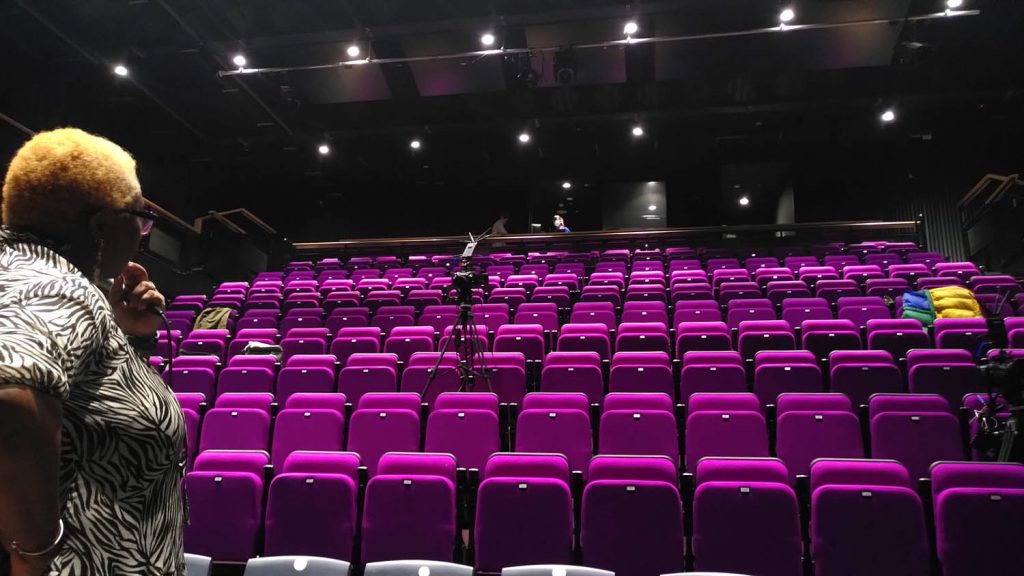
The open rehearsal
In the early evening, friends who had come to bear witness to these stories joined the group to watch an open rehearsal. They were invited into some of the warm up exercises, and the first run through, which went smoothly. The group was pleased it had decided to perform to a live audience as well as film it, and pleased also that the audience was small and very informal. It gave them the freedom to not worry about mistakes and to really enjoy sharing what they had created. An emotional experience for everyone.
“My lasting impression of the performance was the honesty, respect and emotional resonance of all the different positions.”
Audience member
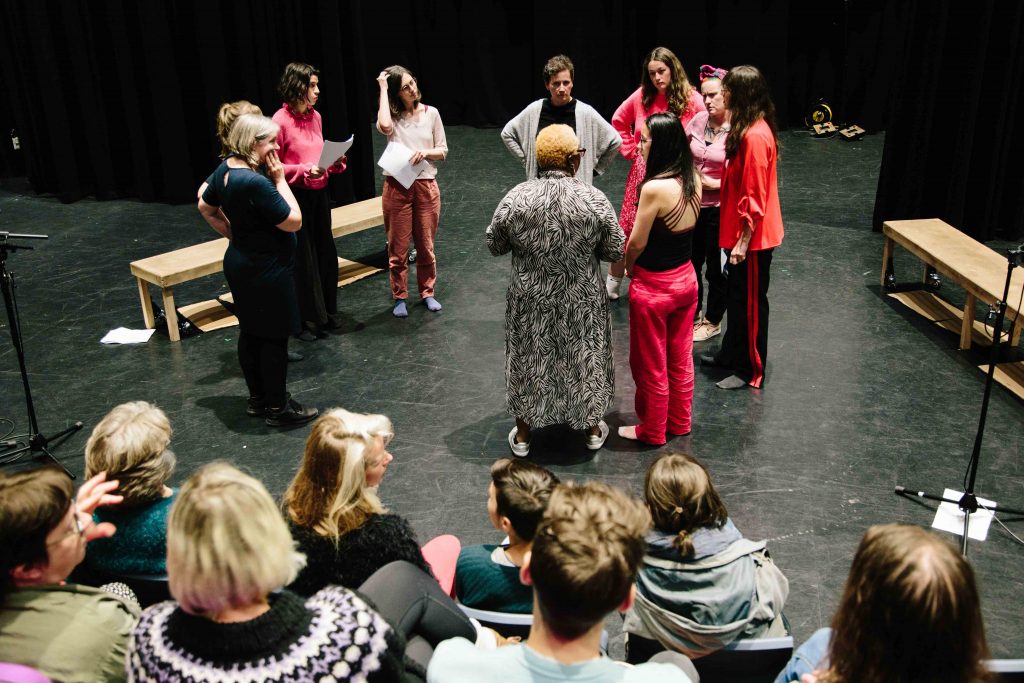
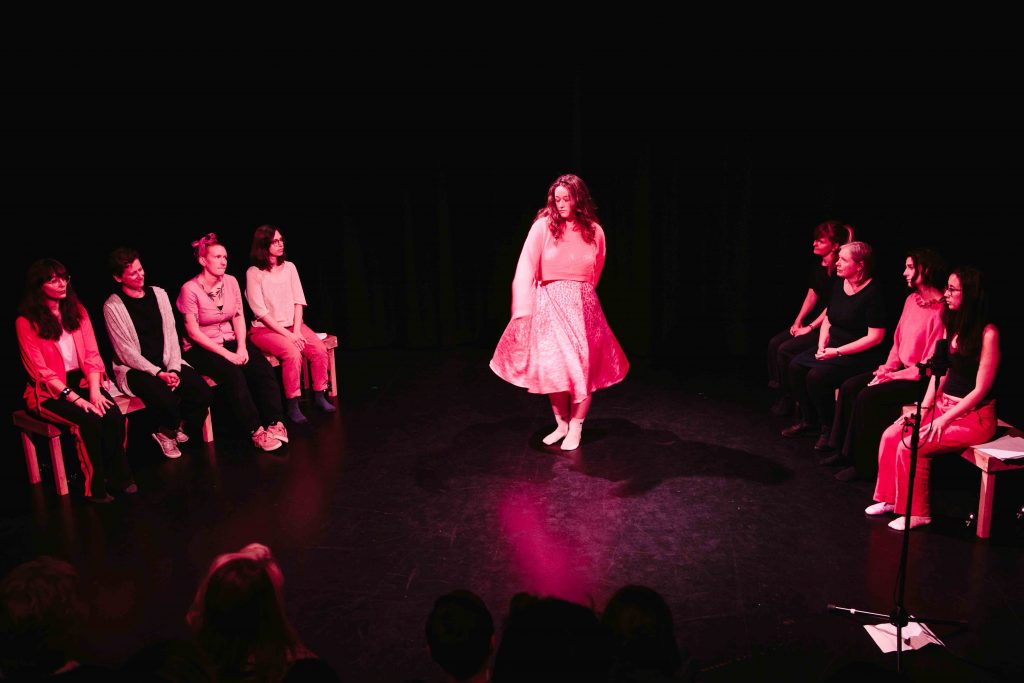
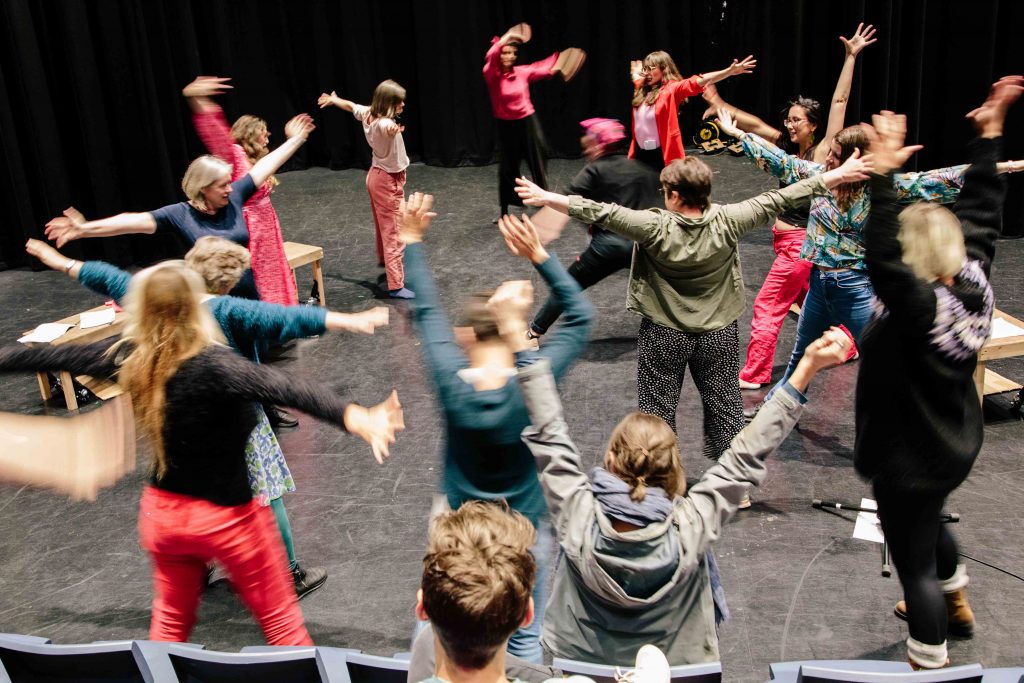
The team had brought in a professional therapist to host a group debrief with participants, in order to make sure care was threaded through their experience and also to take the conversation out to a slightly wider group. While the audience shared their response to the performance in pairs, performers and team had 10 minutes or so in the foyer to celebrate and congratulate each other before they went back into the theatre to join the audience. In retrospect, they realised that they would have liked more direct feedback about the audience’s experience of the open rehearsal. There was open space for anyone to share how they felt, but performers needed more validation of the vulnerable stories they had shared. The evening finished with an informal drink and chat and it helped that the whole team would meet again the next day to hold any vulnerability or unmet needs.
“Everyone was very open, and respectful with listening to other people’s stories and just holding space for them without judgement.”
Audience member
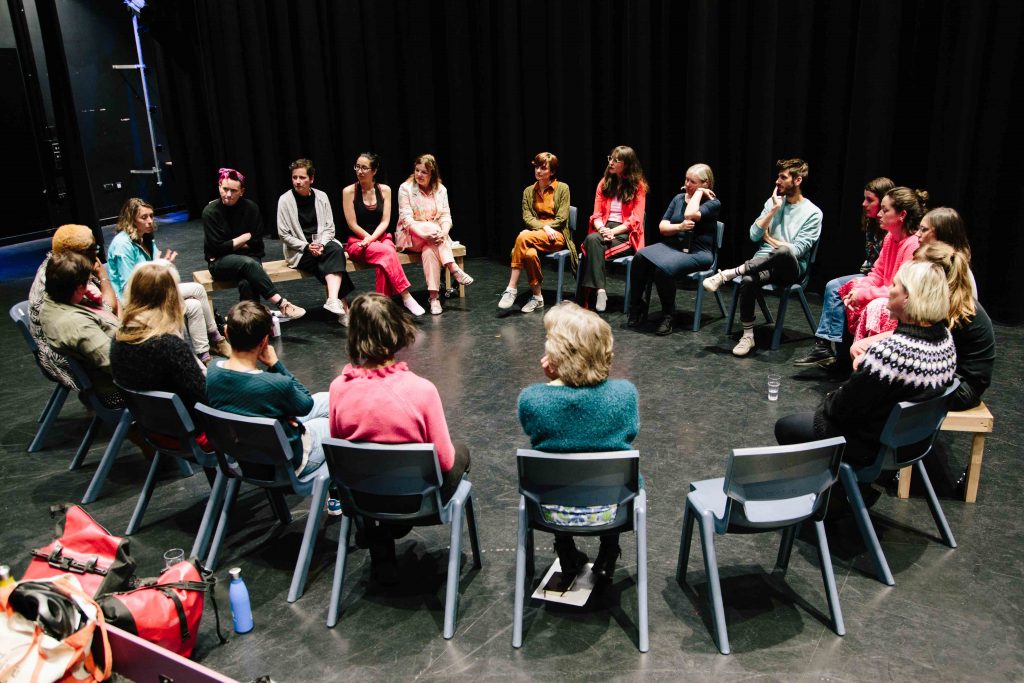
The debriefs
The next morning the project members met for a more extensive debrief. Everyone had chance to share more about their experience and all the performers received appreciative feedback about their pieces. It felt important for the team to meet together so soon after the night before and there was a strong sense of achievement and relief. There was a celebratory lunch before leaving with many hugs and much warmth.
The following week the group had its final planned session online as the dust began to settle on this phase of the project. They were able to share reflections on the whole project, acknowledge the work of the core team, and talk about next steps. They covered issues of consent around sharing the film recordings, ideas about the future of the project, and ways they would keep in touch.
The team was so pleased that everyone who was part of the project was still totally committed right to the end. Addressing a subject as enormous as this, there was every possibility that it would be too difficult for some people to stay involved. The team believes that the way they worked together to create a culture of creativity, welcome, and care helped everyone to stay involved and be willing to contribute their vulnerable stories to a larger process that held everyone.
“I think this was the only true safe space I have ever been in.”
Ruby, Participant

The stories
And so, finally, the project team are ready to share the individual stories. These were recorded straight to camera.
So over to you now, the reader, thank you for taking in the context of the project. These stories are full of heart. It took courage to write and perform them and it takes courage to watch them as well.
Each video is only a few minutes long. They are all different.
The questions
- How did watching one or more of these videos make you feel?
- Do you see yourself in any of these stories? What might you say that would be different?
- Would you share these conversations with anyone you know?
- What might your story of motherhood in a climate crisis be?
The support
- If you need one-to-one support after watching these films, please visit Climate Psychology Alliance and their support service.
- For group support CPA run Climate Cafes and a specific group for Parent/Carer Climate Circles twice a month
- The CPA have also compiled these list of resources for tackling eco-anxiety, including resources for under 18s.
We are grateful for the services the CPA provides. Please consider supporting them.
- Sophia has synthesised some of the core learnings from Britt Wray’s latest book exploring this topic Generation Dread. You might find some helpful concepts here.
Recommended books
A collaborative reading list that has been growing since the project’s inception.
Please note: these are affiliate links from Bookshop.org
Other resources
- Expectant – A genre-bending podcast about the prospect of becoming a parent during climate collapse
- Why I Hesitate to Have a Child: Eco-Anxiety and Reproduction Concerns – Business & Society
- Parenting in a Climate-Changed World – Podcast – “How do we navigate the joys and challenges of parenting in a world shaped by climate change? In this episode, hosts Ben Yosua-Davis and Nicole Diroff explore this question with two thoughtful guests: Elizabeth Rush, acclaimed author of The Quickening: Creation and Community at the Ends of the Earth, and Sophia Cheng, founder of With Many Roots and a new parent herself. Together, they share personal stories, insights, and strategies for parenting amid uncertainty, reflecting on the deep connections between care, community, and climate action.”
- For professionals: Being a Therapist in a Time of Climate Breakdown – book – “Arguing that it is vital for ecological concerns to enter the therapy room, this book calls for change from regulatory bodies, training institutes and individual practitioners.” A chapter in this collection of essays features this project

Project coverage so far
More people opting for child free – ITV News – June 2023
Motherhood in a climate crisis: Women share their anger and fear – BBC News – 19 November 2022
Motherhood in a Climate Crisis – Climate Psychology Alliance podcast – June 2022
Motherhood in a Climate Crisis – Brigstow Institute – Bristol University – March 2022
Storytelling project of our times secures £17k of funding – Future Hub – January 2022
Stay in touch
With Thanks
To our funders:
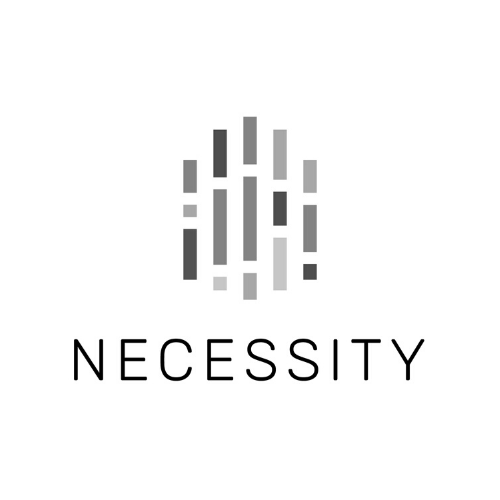
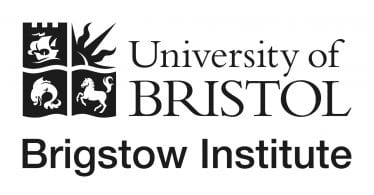

With thanks to Daphne Pleace who helped edit this piece.
Next steps
They are planning the next stage of this project, please get in touch if you would like to be involved. You can contact the project at [email protected]




